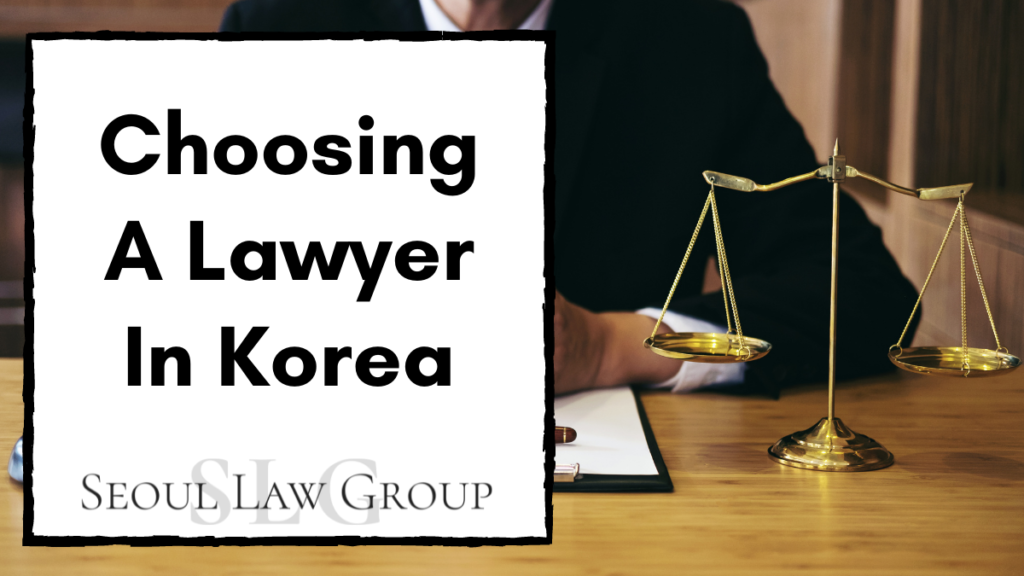Choosing A Lawyer In Korea | How To Find The Best Lawyer For You
Choosing a lawyer is hard, wherever you are. There are many lawyers available, in different price ranges and with different specialties. So how, from that vast pool of potential lawyers, do you choose the one that is best for your case? That already is a difficult enough question if you are in your native country. When you are abroad, it might seem like an impossible task. That is why many foreigners in Korea do not even know where to start when finding an (English-speaking) lawyer to help them in needs.
However, there are a few handy tips and tricks that you can use when choosing a lawyer in Korea. When following these guidelines and with proper research, you will find there are many great lawyers available to help you with your case! Let’s see what you can do when searching for a lawyer in Korea.

Table of Contents
Lawyers in Korea
Law is a popular field of study in Korea and it is no surprise that there are many legal services available in the country. There are small law firms that help with small cases, mid-sized firms for business troubles, and huge, well-known law offices that are pricey, but come with a lot of prestige.
Usually, small law firms (or lawyers who work alone) are specialized in one or two areas of law. Think about criminal law, divorce, labor, inheritance, business, etcetera etcetera. Of course this cannot be generalized because there are many small law firms that handle various fields altogether, just like there are not only specialists but also general practitioners among doctors. Mid-sized law firms often employ multiple lawyers that cover various fields, making it a larger and full-service office. Large law firms are usually well-known for their top-notch service, and work for huge companies and businesses. This, however, makes them a lot pricier.
In general, a lawyer in Korea is similarly priced to the West. It averages around KRW 150,000 to KRW 600,000 (or upwards) per hour. The price depends on the attorney’s (or the law firm’s) reputation and experience, and mainly the size and difficulty of the case itself.
Of course, as a foreigner, it could be very important that your lawyer speaks English. Even if you feel very fluent in Korean, legal terms are a whole other story. As law cases often are very important to your livelihood, it is key that you understand everything that is being discussed. Most major firms do have English-speaking lawyers, and there are also several small law firms that cater exclusively to a foreign clientele. These smaller firms are often great for visa-related matters, as they are specialized in the laws that pertain to foreigners.
You can also make use of a translation service to translate Korean into English (or any other language you choose). This, however, could come at an extra cost.
It is also good to know that the Seoul Global Center offers free legal consultation for foreigners. However, they will not argue your case for you. Instead, they can advise you on the best course of action for your problem: what kind of lawyer to hire, where to look, and where to find legal translators.
Choosing a Lawyer in Korea
So, there are definitely many lawyers in Korea that can help you out. How do you go about your search? You can use this handy checklist to help you choose a lawyer in Korea.
1. Right Lawyer For Your Case
First, you need to understand the problem that is facing you and pick an appropriate specialist. You do not want a family lawyer looking at your corporate compliance issues. Like doctors, lawyers are specialized in a certain field. You would want a specialist because they will know the latest legal development and nuances.
Start off by determining what problem is facing you. You can google to see if people have had similar problems and what kind of lawyer they have hired. You can also ask your friends, family, business consultant, or accountant (depending on the situation). If you want to employ a large, prestigious law firm, you can also ask them for advice on what kind of lawyer is best for your case. Finally, you can also consult the Seoul Global Center for free for help with this.
2. Experienced Lawyer
Next, you should find out how much experience your lawyer has in their field. You can do that simply by asking them for their record of experience and going over the cases they have won (and lost). It is also a good idea to do a Google and LinkedIn search of the lawyer and law firm in question, to see what comes up there.
Also, explore the firm’s website. Whether they have an English website or not is usually already a good indication that the firm has experience dealing with foreigners. This does not mean that a law firm without an English website does not have an English-speaking lawyer of course. However, there is a difference between a Korean lawyer that is specialized in handling cases pertaining to foreigners, and a Korean lawyer that just speaks good English. If you have a case that is very specific to your immigrant status, then a lawyer that has experience with foreigners would be a good idea. However, if your case is a common case in Korea – for example pertaining to corporate compliance, criminal defense, or labor issues – a Korean lawyer that speaks English well would bejust fine.

3. English Speaking Lawyer
This brings us to the next point: look for an English-speaking lawyer, or a law firm that offers translation services as part of the package. Besides what we mentioned above – the importance of lawyers in having dealt with foreigners – good communication is very important when hiring a lawyer.
Legal cases are often difficult, and a lot of difficult terms and laws will be thrown your way. You need a lawyer that can explain to you what is happening carefully and precisely. Likewise, it is also important that your lawyer should be able to listen to your story and properly understand your situation. Even if you explain what kind of trouble you are in, it would be no use if the lawyer cannot understand your word.
How do you know if your lawyer communicates well in English? Call them, email them, and meet them. Explain them your situation in English and see what kind of solution they come up with. Have them explain the entire process to you and see how you get along with them. Their English does not have to be absolutely perfect. What is important is that you understand what they are saying, and they understand yours.
4. Right Approach For Your Case
Some lawyers are aggressive, others are cunning and calculating. Find a lawyer whose style fits your case – and personality – best. You do not want an aggressive lawyer on a minor visa issue, that will most likely not be appreciated by the court. However, in the case of a major criminal issue, an aggressive lawyer might be better suited to the situation.
5. A Small Firm Or A Large Firm?
Whether you choose a smaller or a larger firm depends largely on your preferences, your case, and your budget. At a small firm, you will most likely work with only one person. This makes the costs lower, but there is less of a support network. Small firms are best suited for relatively simple/small cases, like a labor dispute or a visa issue.
Larger firms have a large support network, making them more suited to handle complex cases. However, they could be more expensive, as you pay for multiple lawyers and their support network. If your case is difficult – dealing with corporate compliance, or a severe criminal case – then a large firm might be better suited to your needs.
6. Check The Lawyer’s References
When you are close to picking your lawyer, gather all the references you can and check them! You can often ask the lawyer or law firm for references too but beware that they usually provide only good references. Do a Google and Naver search and look for reviews of their previous clients. This is where Naver blogs come in really handy. Although they are usually in Korean, you can use Google Translate or Papago to translate them and read the reviews. Always look for the lawyer’s name in English and Korean.
7. Get Clarity On Staffing
If you hire a small law firm, you will likely only work with one lawyer, who will handle your case from the beginning until the end. However, if you work with a big firm, or have a complicated case, it is very likely that multiple attorneys will be working on your issue. From the start, ask how your case will be staffed who will be responsible, and if any paralegals and support staff will be used.
8. How Much Will It Cost?
Cost should definitely factor into your choice of a lawyer. Ask your lawyer to be upfront with you about the costs. How will you be billed, hourly or through a contingency arrangement? What will be the estimated cost? Will there be a discount if the case goes on longer than expected? Are there any additional costs for staffing or services? Get all of these questions sorted out early on in the process.
9. Choose A Lawyer That Has Experience With Your Region
This might seem logical, but nevertheless important: choose a lawyer that has experience working with the region. If your case is a local case – for example about local labor law – make sure you find a lawyer that has experience dealing with Korean labor law. However, if your case spans countries, it is important that you find a lawyer that has international experience. For example, if your case has to do with customs, import duties, or international trade, a law firm with international experience is best suited for this, even if the case is brought to the Korean court.
10. A Professional Lawyer
Koreans are well-known for their professionalism and kind and service-oriented manners. Lawyers are no exception. However, some foreigners have experienced lawyers that were rude or uncommunicative towards them, whilst perfectly polite in Korean. That is why it is important to judge a lawyer’s professionalism. Look at how they talk to you, how they prepare for meetings, and how seriously they take your case.
